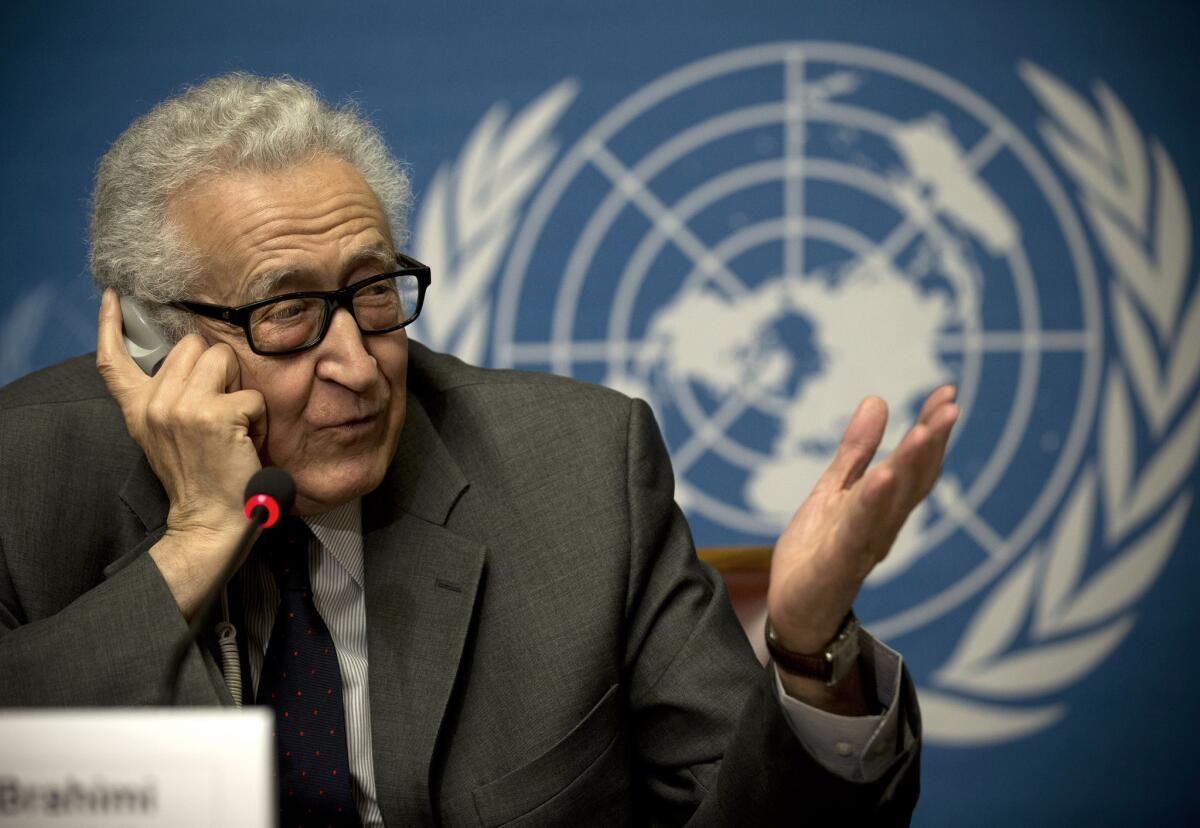Syria’s warring sides to meet in same room Saturday, mediator says

GENEVA -- The two opposing sides in Syria’s peace negotiations have agreed to meet in the same room, the chief United Nations mediator announced Friday, following a turbulent first day of talks during which the two camps remained apart and the Syrian government threatened to withdraw.
“We are going to meet tomorrow,” Lakhdar Brahimi, the U.N.-Arab League special envoy for Syria, told journalists, dismissing speculation that the long-awaited Syrian peace initiative was unraveling.
“I hope that it will be a good beginning, and that we will continue until the end of next week. ... Nobody will be leaving on Saturday, and nobody will be leaving on Sunday,” he said.
Brahimi said the two sides would be meeting “in the same room,” but did not specify that the session would be face to face. That left open the possibility that the two delegations could be sitting at different tables or that some other accommodation would be made to avoid a face-to-face encounter.
[Updated, 12:15 p.m. PST Jan. 24: In a subsequent interview with the Los Angeles Times, Brahimi confirmed that Saturday’s meeting between the two sides would be “face to face.”]
The sensitive architecture of the talks emerged as a key point of contention Friday, after plans for direct talks between the two warring sides were scrapped.
The conference has been billed as the first time that the sides would sit down together after almost three years of war have left tens of thousands dead, sown instability throughout the Middle East and turned parts of Syria into a breeding ground for Al Qaeda-linked militants.
But the U.S.-backed Syrian opposition balked at sitting down with its adversary unless the government of President Bashar Assad explicitly endorsed a plan to yield power to a transitional government, a stated goal of the talks. The opposition bloc here is demanding that Assad step down, a condition rejected by the Syrian president.
The Syrian government, for its part, threatened to walk out if serious negotiations did not get underway by Saturday. Damascus also said it would not agree to what it called “preconditions” for talks. Assad’s future is not up for discussion, the government says.
“The problem is that these people do not want to make peace, they are coming here with preconditions,” Syrian Deputy Foreign Minister Faisal Mekdad told reporters. “Of course we are ready to sit in the same room. Why are we coming here then?”
On Friday, Brahimi met separately in closed-door consultations with representatives of Assad’s government and the opposition Syrian National Coalition. At day’s end, Brahimi called the talks “encouraging,” but added that discussion of specific issues had yet to take place.
“We knew that it was going to be difficult, complicated,” Brahimi later told reporters, referring to “bumps in the road” during the session. “We never expected this to be easy.”
The widespread expectation had been that the two sides would meet on Friday, the first day of scheduled talks after opening speeches Wednesday in the Swiss city of Montreux.
Diplomats say the likelihood of a major breakthrough at the talks is remote, given the deep differences and profound animosity between the two sides. But officials are hopeful of some kind of progress, including possible agreements on localized truces, prisoner exchanges and improved access for humanitarian aid.
The U.N.-backed talks were initiated by the United States and Russia in a bid to find a political solution to the Syrian conflict. Washington backs opposition demands that Assad cede power, while Russia remains a major supporter of Assad’s government.
Twitter: @mcdneville
More to Read
Start your day right
Sign up for Essential California for news, features and recommendations from the L.A. Times and beyond in your inbox six days a week.
You may occasionally receive promotional content from the Los Angeles Times.






